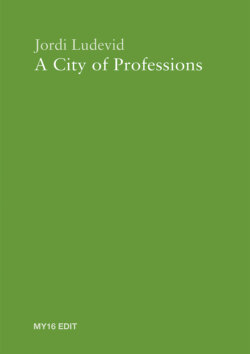Читать книгу A City of Professions - Jordi Ludevid Anglada - Страница 16
На сайте Литреса книга снята с продажи.
ОглавлениеHippocrates
Like so many other things, the professional fact was born in Greece.13 Hippocrates of Kos (Kos, c. 460 BC - Thessaly, c. 370 BC) was an ancient Greek physician who practised during the so-called Age of Pericles. Considered to be one of the most prominent figures in the history of medicine, many authors refer to him as the father of medicine and, by extension, of the professional phenomenon. His intellectual school revolutionised medicine in his time, establishing it as a discipline separate from other fields with which it had traditionally been associated, transforming the practice of medicine into a profession.
The term profession (from the Latin professio, -ōnis) designates a trade, job or occupation that is normally exercised in exchange for remuneration. It also defines the set of professionals who exercise it. Professional activity requires specialised and practical knowledge, professional training, educational training at different levels depending on the case, mastery over the content of the work, and organisation through professional associations, in addition to ethical standards, professional ethics and a certain spirit of service to the community. The term professional emerged to define the person who carries out a profession.
It is worth taking particular note of the Hippocratic Oath, a public oath that may be taken by those who have received a degree in medicine. It has a civic and ethical content, which guides physicians in the practice of their profession. In its original form, it regulated obligations to the teachers and their families, to pupils, to colleagues and to patients. From the 19th century onwards it became common, but not universal, to swear an oath based on an updated text, which differed according to the values of each time and place. Wherever it is preserved, it is considered a rite of passage or initiation after graduation, prior to entering the professional practice of medicine.
It is absolutely fundamental to emphasise that the Hippocratic tradition establishes the professional fact on the basis of a two-fold commitment: the philo technè14 and the philo anthropoiè. As we shall see, this pairing withstands the test of time through history right up to the present day. In other words, «affection and commitment to practical knowledge» and «affection and commitment to people».15
Hippocrates’ proposals can be extended to all professions, as indeed they have been. His ethical code postulates concepts and principles that were later taken up by Cicero and which survive to this day, such as beneficence, compassion, commitment, confidentiality, social justice, excellence, training, the value of life, etc. And above all, «do no harm», the principle of non-maleficence, not using the practice to cause harm. These concepts gave rise to the so-called principles of the professions. Today, the four principles – beneficence, autonomy, justice and non-maleficence – are recognised and widely used: they have been followed, for example, by the National Bioethics Commission in the United States since the 1970s.
13 Hammurabi’s Code contained provisions on doctors’ fees and on the penal code applicable to architects. It did not discuss the professions, although it implicitly recognised them. In ancient Greece and later in Egypt and Rome there were associations of merchants and craftsmen. Around the same time (5th century B.C.), Chinese Confucianism was an impressive phenomenon very similar to professionalisation.
14 It may be useful to point out the similarities between philo technè and craftsmanship.
15 See, for example, El médico y el enfermo, by Pedro Laín Entralgo, Madrid: Triacastela, 2003.
